- Home
- Markus Zusak
Bridge of Clay Page 14
Bridge of Clay Read online
Page 14
Where was the Goddamn water?!
Earlier, when they’d seen each other, their faces searched, then down. Only when they were meters apart did they look for more than a second.
The ground felt alive.
Final darkness, and still no sound.
“Can I help with your bags?”
“No thanks.”
His father’s hand had been awfully clammy. His eyes were nervous, badly blinking. His face stooped, his walk was fatigued, and his voice was rarely used; Clay could hear that. He knew that all too well.
When they walked to the house and sat on the front step, the Murderer partly sank. His forearms were splayed; he held his face.
“You came.”
Yes, Clay thought. I came.
Had it been anyone else, he’d have reached across and placed a hand on his back, to say it’s okay.
But he couldn’t.
There was only one thought, and the repetition of that thought.
I came. I came.
Today, that would have to be all.
* * *
—
When the Murderer recovered, it was a good while sitting there before they went in. The closer you got to it, the itchier the house seemed:
Rusty gutters, scales of paint.
It was surrounded by a virulent weed.
In front of them, the moon glowed, onto the worn-out path.
Inside, there were cream walls, and a great blast of hollow; all of it smelt alone.
“Cup of coffee?”
“No thanks.”
“Tea?”
“No.”
“Something to eat?”
“No.”
They sat in the quiet of the lounge room. A coffee table was loaded with books, journals, and bridge plans. A couch ate them up, both father and son.
Jesus.
“Sorry—it’s a bit of a shock, isn’t it?”
“That’s okay.”
They were really hitting it off.
* * *
—
Eventually, they stood again, and the boy was given a tour.
It didn’t take very long, but it was useful to know where to sleep, and where the bathroom was.
“I’ll let you unpack, and have a shower.”
In the bedroom there was a wooden desk, where he set up each and every book. He put clothes in the wardrobe, and sat on the bed. All he wanted was to be home again—he could have sobbed just to walk through the door. Or sit on the roof with Henry. Or see Rory staggering up Archer Street, a whole neighborhood of letterboxes on his back…
“Clay?”
He lifted his head.
“Come and eat something.”
His stomach roared.
He leaned forward, feet glued to the floor.
He held the wooden box, he held the lighter and looked at Matador, and the fresh-collected peg.
For a whole range of reasons, Clay couldn’t move.
Not yet, but soon.
Of course, Abbey Hanley hadn’t meant to destroy him.
It was just one of those things.
But one of those things turns into other things, which lead to more coincidence, which leads many years later to boys and kitchens, boys and hate—and without that long-lost girl there was none of it:
No Penelope.
No Dunbar boys.
No bridge, and no Clay.
* * *
—
All those years earlier, when it came to Michael and Abbey, everything was open and beautiful.
He loved her with lines and color.
He loved her more than Michelangelo.
He loved her more than the David, and those struggling, statued slaves.
At the end of school, both he and Abbey made good scores, they made city scores, and they were numbers of escape and wonder.
On Main Street, there was the odd pat on the back.
A few congratulationses.
Sometimes, though, there was a mild disdain, a sense of why-the-hell-would-you-want-to-leave? It was the men who did it best, especially the older ones, with their ripe faces, and an eye clenched tight at the sun. The words came out lopsided:
“So you’re goin’ the city, huh?”
“Yes, sir.”
“Sir? You’re not fuckin’ there yet!”
“Shit—sorry.”
“Well, just don’t let ’em turn you into an arsehole, all right?”
“Say again?”
“You ’eard me….Don’t let ’em change y’ like they change every other bastard who leaves. Never forget where y’ from, right?”
“Right.”
“Or what y’ are.”
“Okay.”
Clearly, Michael Dunbar was from Featherton, and he was a bastard, but potentially an arsehole. The thing is, no one ever said, “And don’t do anything that’ll earn you a nickname like Murderer.”
It was a big world out there, and the possibilities were endless.
* * *
—
The day the results came in, Christmas holidays, Abbey told him she’d stood by the letterbox. He almost could have painted it:
The mass of empty sky.
A hand on her hip.
She’d baked in the sun for twenty minutes before she went back for a lawn chair and a beach umbrella, a thousand miles from the sea. Then for a cooler, and some Icy Poles; God, she had to get out of here.
In town, Michael was hurling bricks up to a guy on a scaffold who was hurling bricks up to another guy. Somewhere, much higher, someone was laying those bricks, and a new pub was going up: for miners, farmers and minors.
At lunch, he walked home and saw his future, folded up, poking out, in the cylinder reserved for the junk mail.
Ignoring the omen, he opened it. He smiled.
When he phoned Abbey, she was panting from running up the path. “I’m still waiting! Bloody town wants to keep me here an extra hour or two, I reckon, just to punish me.”
Later, though, at the job, she’d appeared and stood behind him, and he’d glanced back and dropped his bricks, one each side. He faced her fully. “Well?”
She nodded.
She laughed and so did Michael, until the voice flew down, between them.
“Oi, Dunbar, y’ useless prick! Where are me Goddamn bricks?!”
Abbey, ever-present, called back.
“Poetry!”
She grinned, and left.
A few weeks later, they left.
* * *
—
Yes, they packed and headed for the city, and how do you sum up four years of apparent, idyllic happiness? If Penny Dunbar was good at using a part to tell the whole, these were parts that remained only that—just fragments and drifting moments:
They drove eleven hours, till they saw the rising skyline.
They pulled over and watched the length of it, and Abbey stood up on the hood.
They drove onwards till they were in it, and part of it, and the girl was in her commerce degree, and Michael was painting and sculpting, surviving the surrounding geniuses.
They both worked part-time jobs:
One serving drinks in a nightclub.
The other as a laborer, on construction sites.
At night, they’d fall into bed, and each other.
There were pieces, given and taken.
Season after season.
Year after year.
Now and then, on afternoons, they ate fish-’n’-chips at the beach, and watched the seagulls appear, like magic, like rabbits out of hats. They felt the myriad sea breezes, each one different from the last, and the weight of heat and humidity. Sometimes they’d just sit there, as a giant black cloud floate
d in, like the mother ship, and then run in its oncoming rain. It was rain that fell like a city itself, with the coast-long nighttime southerly.
It was milestones, too, and birthdays, and one in particular, when she gave him a book—a beautiful hardcover with bronze lettering—called The Quarryman, and Michael staying up reading, while she slept against his legs. Always, before he closed it, he’d go again to the front, to the author’s short biography, where below, midpage, she’d written:
For Michael Dunbar—the only one
I love, and love
and love.
From Abbey
And of course, not long after, it was going home to get married on a still spring day with the crows aaring outside, like inland pirates:
Abbey’s mother sobbed happily in the front pew.
Her father traded a worn work singlet for a suit.
Adelle Dunbar sat with the good doctor, eyes glowing behind some brand-new blue-rimmed glasses.
It was Abbey crying herself that day, all wet, white dress and smoky.
It was Michael Dunbar as a younger man, carrying her out into sunshine.
It was driving back, a few days later, and stopping halfway, where the river was awesome, something insane, raging downstream—a river with a strange name, but a name they loved—the Amahnu.
It was lying there, under a tree, her hair itching him, and him not moving it, ever, and Abbey telling him she’d love to come back; and Michael saying, “Of course—we’ll make money, and build a house, and come here whenever we want.”
It was Abbey and Michael Dunbar:
Two of the happiest bastards who ever had the nerve to leave.
And oblivious of all to come.
The night was long, and loud with Clay’s thoughts.
At one point, he got up to use the bathroom and found the Murderer, half-swallowed, on the couch. Books and diagrams weighed him down.
For a while, he stood over him.
He looked at the books, and the sketches on the Murderer’s chest. The bridge, it appeared, was his blanket.
Then the morning—but morning wasn’t morning at all, it was two in the afternoon, and Clay woke in bed with a fretful start, the sun on his throat, like Hector. Its presence in the room was huge.
When he got up he was totally mortified; he scrambled. No. No. Where is he? Quickly, he stumbled to the hall, got outside, and stood on the porch in his shorts. How could I have slept so long?
“Hey.”
The Murderer watched him.
He’d come round from the side of the house.
* * *
—
He got dressed and they sat in the kitchen, and this time he ate. The old oven with its black-and-white clock had barely clicked over from 2:11 to 2:12, and he’d eaten a few slices of bread, and a fair few murderous eggs.
“Keep going. You’re going to need your strength.”
“Sorry?”
Now the Murderer chewed and sat, he was opposite.
Did he know something Clay didn’t?
Yes.
There’d been calls from the bedroom through the morning.
He’d slept and shouted my name.
* * *
—
One long sleep and now I’m behind.
That was Clay’s recurring thought as he continued to eat in spite of himself—and he would fight to scratch himself free.
Bread and words. “It won’t happen again.”
“Sorry?”
“I never sleep that long. I barely sleep at all.”
Michael smiled; yes, he was Michael. Was that a past lifeblood flowing through him again? Or was that just how it appeared?
“Clay, it’s okay.”
“It’s not—ah—God!”
He’d rushed to stand up and collected the table with his knee.
“Clay—please.”
For the first time, he studied the face in front of him. It was an older version of me, but the eyes not caught by fire. All the rest of him, though: the black hair, even the tiredness looked the same.
He pulled his chair out properly this time, but the Murderer held up a hand. “Stop.”
But Clay was ready to walk, and not just out of the room.
“No,” he said, “I—”
Again, the hand. Worn and calloused. Workman’s hands. He waved as if at a fly on a birthday cake. “Shh. What do you think’s out there?”
Which meant:
What was it that made you come here?
All Clay heard was the insects. The single note.
Then the thought of something great.
He stood, bent-postured against the table. He lied, he said, “There’s nothing.”
The Murderer wasn’t fooled. “No, Clay, it brought you here, but you’re afraid, so it’s easier to sit here and argue.”
Clay straightened. “What are you even talking about?”
“I’m saying it’s okay—” He broke off, and slowly studied him. A boy he couldn’t touch, or reach. “I don’t know how long you stood in those trees yesterday, but you must have come out for a reason….”
Jesus.
The thought came in with the heat.
He saw me. All afternoon.
And “Stay,” said the Murderer, “and eat. Because tomorrow I have to show you—there’s something you need to see.”
In terms of Michael and Abbey Dunbar, I guess it’s time to ask:
What was the real happiness between them?
What was the truth?
The true one?
Let’s start with the artwork.
Sure, he could paint well, often beautifully; he could capture a face, or see things a certain way. He could realize it on canvas or paper, but when it came down to it, he knew: he worked twice as hard as the students around him, who could all produce somehow faster. And he was truly gifted in only one area, which was something he also clung to.
He was good at painting Abbey.
* * *
—
Several times, he’d nearly quit art school altogether.
The only thing that stopped him was the thought of going back to her, admitting failure. So he stayed. He somehow survived on good essays and flashes of brilliance when he so much as inserted her into a background. Someone would always say, “Hey, I like this bit.” There was patience and revelation only for her.
For his final assignment, he found an abandoned door and painted her, both sides of it. On one panel she was reaching for the handle, on the other she was leaving. She entered as a teenager; the girl in school uniform, that bony-yet-softness, and endless hair. Behind it, she left—high-heeled, in a bob, all business—looking over her shoulder, at everything in between. When he received his result, he knew already what it would say. He was right:
Door idea fairly cliché.
Technique proficient but no more, but I admit I want to know her.
I want to know what happened in between.
Whatever did lie in the world between those images, you knew this woman would be okay on the other side—especially, as it turned out, without him.
* * *
—
When they returned to the city married, they rented a small house on Pepper Street. Number thirty-seven. Abbey had a bank job—the first one she applied for—and Michael worked the construction sites, and painted in the garage.
It was surprising how quickly the cracks appeared.
Not even a year.
Certain things became obvious, like everything was her idea:
That house for rent, those black-edged plates.
They went and saw movies when it was her thought, not his, and while her degree propelled her immediately forward, he was where he’d always been, on those building sla
bs; it felt like she was a life force, and he was just a life. In the beginning, the end was this:
It was night.
It was bed.
She sighed.
He raised his head to see. “What is it?”
She said, “Not like that.”
And from there it went from “Show me” to “I can’t teach you anymore” to “What do you mean?” to her sitting up and saying, “I mean I can’t show you everything, I can’t take you with me. You have to figure it out.”
Michael was shocked at how calmly she delivered the blows, with the dark up against the window.
“In all the time we’ve been together, I don’t think you’ve ever really…” She stopped.
“What?”
It was such a small swallow, to prepare. “Initiated.”
“Initiated? Initiated what?”
“I don’t know—everything—where we live, what we do, what we eat, where and when and how we—”
“Jesus, I—”
She sat up a notch higher. “You never just take me. You never make me feel like you have to have me, no matter what. You make me feel like…”
He didn’t want to know. “Like—what?”
In a mildly slighter tone: “Like the boy I pulled down to the floor, back home…”
“I—” But there was nothing else there.
Just I.
I and nothingness.
I and sinking, and the clothes hung over a chair—and Abbey wasn’t finished.
“And maybe everything else too, like I said…”
“Everything else?”
The room felt sewn together now, there to be pulled apart. “I don’t know.” She sat straighter, yet again, for the courage. “Maybe without me, you’d still be at home with all the arsehole sayers, blue singlet wearers, and the rest. You might still be cleaning that shit-heap surgery and throwing bricks up to other blokes throwing bricks up.”
He ate down his heart, and a fair share of the dark. “I came to you.”

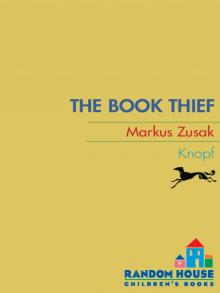 The Book Thief
The Book Thief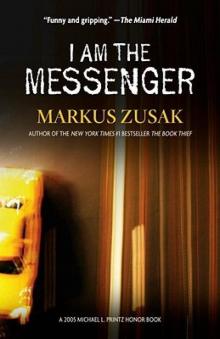 I Am the Messenger
I Am the Messenger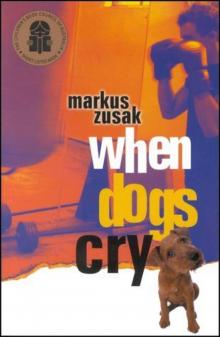 When Dogs Cry
When Dogs Cry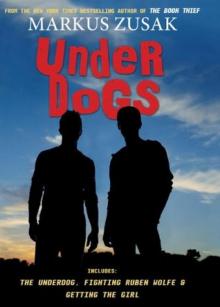 Underdogs
Underdogs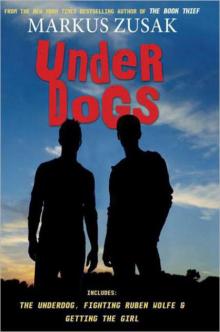 Underdogs: Three Novels
Underdogs: Three Novels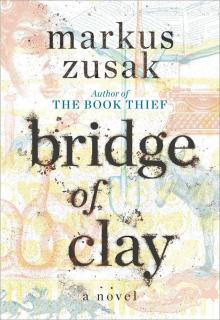 Bridge of Clay
Bridge of Clay